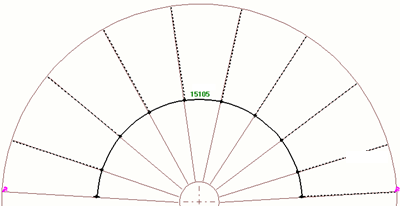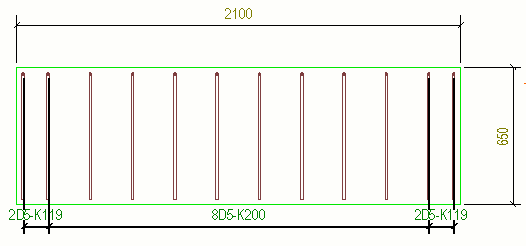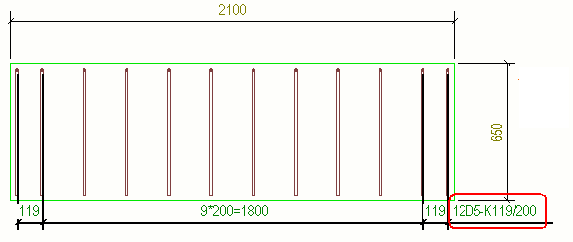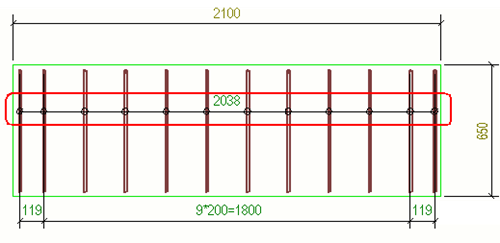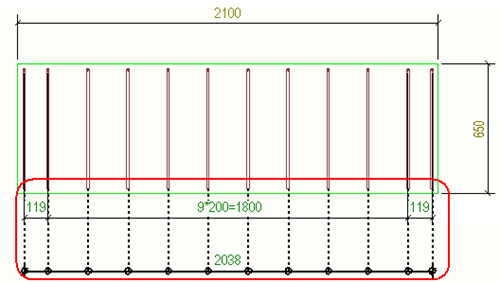Add dimensions to reinforcement manually
You can manually add dimensions to reinforcing bar groups.
Each reinforcing bar group may have dimension marks with or without tags, distributed dimension lines, or variants of these styles. The dimensions are created based on the dimension properties defined in the rebar dimension mark properties. The Rebar command for creating the rebar dimension marks is available in GA drawings and cast unit drawings.
- You might want to add rebar dimension marks especially in concrete cast unit drawings, where there is only one reinforced cast unit visible.
-
The dimension lines or distribution lines show the distribution of the rebars in the group, and typically draw dashed lines from the dimension lines to the rebars when you drag the dimension outside the rebar group. You might want to use distribution lines especially in GA reinforcement drawings, because they may contain a lot of parts with rebar groups, and you often need to show only one rebar from the group and drag the dimension line to a proper place to see everything clearly.
-
When adding dimensions, start by using the predefined dimension settings defined in your own environment. You can modify these settings for individual dimensions, if necessary.
The Default environment contains the following rebar dimension settings files you can load in the rebar dimension mark properties:
-
rebar_dimension_linefor creating distribution lines -
rebar_dimension_markfor creating dimension marks -
rebar_tagged_dimension_markfor creating tagged dimension marks
For more information about typical settings, see section "Typical dimension mark, tagged dimension mark, and dimension line settings" below.
In addition to the rebar dimensioning methods described below, you can also dimension rebars by using the Rebar group dimensioning application, see Dimension rebars with Rebar group dimensioning application.
Add dimensions to rebar groups
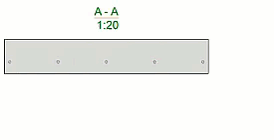
You can change the representation of the current rebar dimension after creating it by clicking the rebar dimension in an open drawing, and modifying the dimension properties as required. For example, you might want to add more tags, or select how to align tags in curved dimensions.
Note that you cannot change the following properties when you have a drawing open and you are editing a rebar dimension mark:
Dimension to
Part edge
Tapered dimension type
Curved dimension type
Placing rebar dimensions
During manual dimension creation the Placing method setting is considered as follows:
- If you have selected more than one rebar object, the Dimension mark command ignores the Fixed option and automatically places the rebar dimension mark for each selected rebar object.
- If you have selected only one rebar object, and Placing method is set to Fixed, you will be prompted to pick a position for the dimension.
- If you have selected only one rebar object, and Placing method is set to Free, the dimension will be placed automatically.
- With the Rebar command on the ribbon, you can create rebar dimension marks without
selecting a rebar object first. In this case, you will be prompted to pick a
rebar object:
- If Placing method is set to Fixed, you will be prompted to pick a position for the dimension, and if Placing method is set to Free, the dimension will be placed automatically.
- After the dimension has been placed either manually or automatically, you will be prompted to pick another rebar object.
Typical dimension mark, tagged dimension mark, and dimension line settings
rebar_dimension_mark.rdim
Dimension to: All rebars
Subgrouping: selected
Extension line to visible rebar: not selected
Combine equal dimensions: 3*60=180
Minimum number to combine: 1
Prefix set in dimension tags.
Show numeric value: not selected.
rebar_tagged_dimension_mark.rdim
Dimension to: All rebars
Subgrouping: selected
Extension line to visible rebar: not selected
Combine equal dimensions: 3*60=180
Minimum number to combine: 1
Set the appropriate tag contents.
rebar_dimension_line.rdim
Dimension to: Start and end rebars
Subgrouping: not selected
Extension line to visible rebar: selected
Combine equal dimensions: Off
Create dimension marks to all rebars
You can add dimension marks to all rebars at one go with the Create dimension marks to all rebars application. This application creates any types of rebar dimension marks.
-
Open a rebar drawing.
-
To adjust the rebar dimension mark properties, open the drawing property pane object list and select Rebar dimension mark.
-
Click the Applications & components button
 in the side pane to open the
Applications & components catalog.
in the side pane to open the
Applications & components catalog. -
Search for the Create dimension marks to all rebars application, and double-click the application.
Rebar dimension marks are created for all rebars according to the defined rebar dimension mark properties.
Examples of rebar dimensions
- Below is a tapered skewed part, and the dimension
line follows the shape of the edge that is closest to where you pick. The
dimensions have Skewed representation.
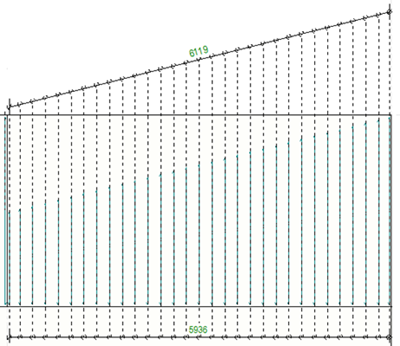
- Below is a tapered curved part, and the dimensions
have Curved representation.
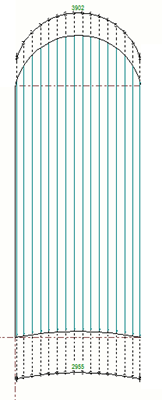
-
Below is an example of curved orthogonal dimensions of a tapered curved rebar group with a dimension tag:
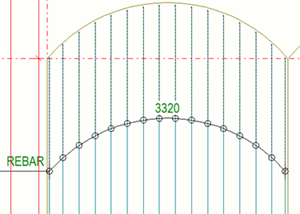
-
You can also add middle tags in rebar dimensions. Here dual dimensions have been applied:
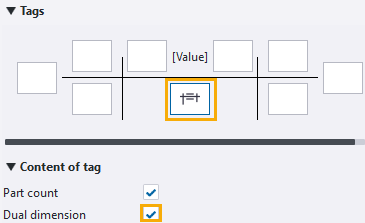
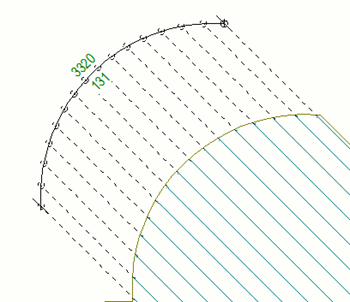
-
Curved dimension tags can be aligned by selecting one of the options in the Curved dimension tag type list in the dimension properties:
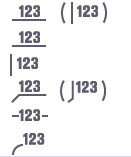
In the example below, only one rebar is visible, and rebar tags are aligned vertically
 :
:
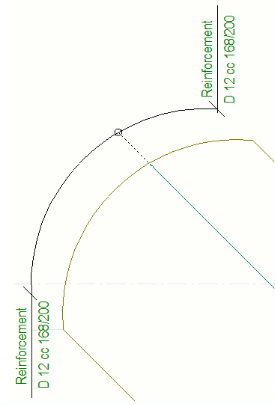
In the example below, the dimension tag follows along the dimension curve
 :
: 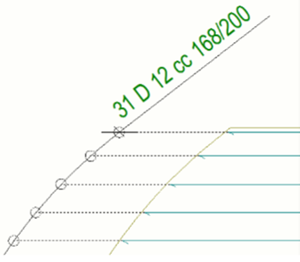
-
Below is an example of curved orthogonal dimensions in a radial reinforcing bar group.
